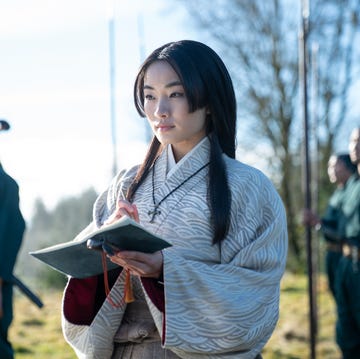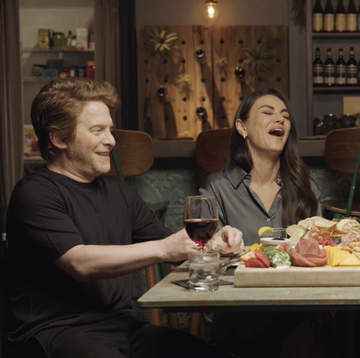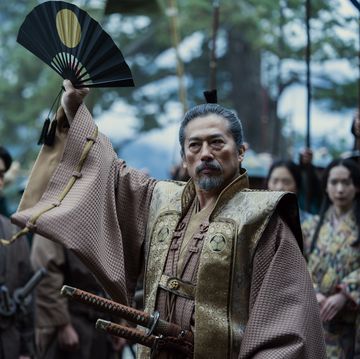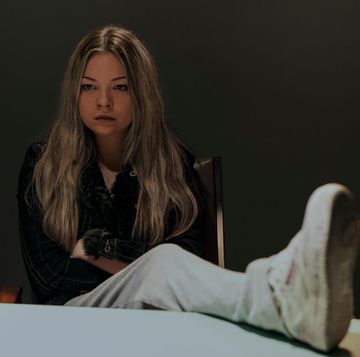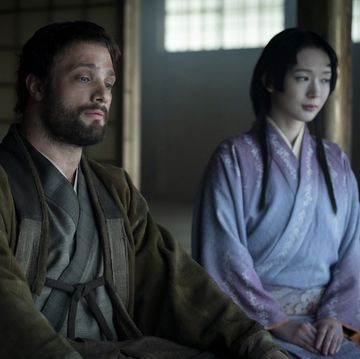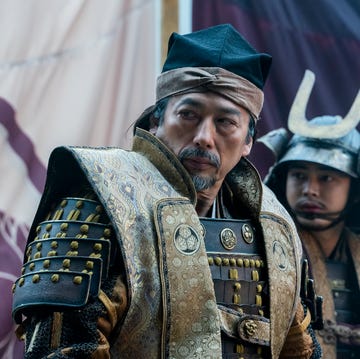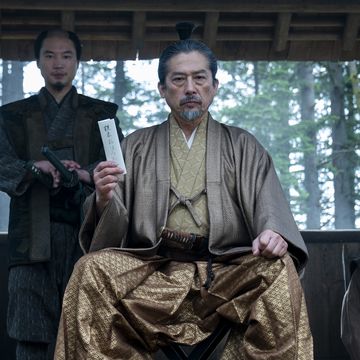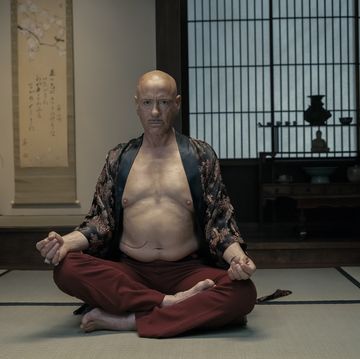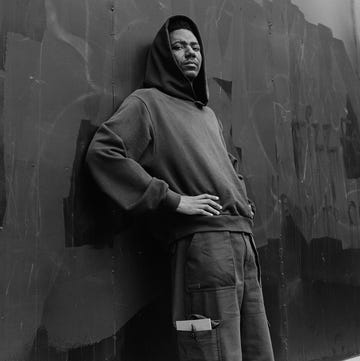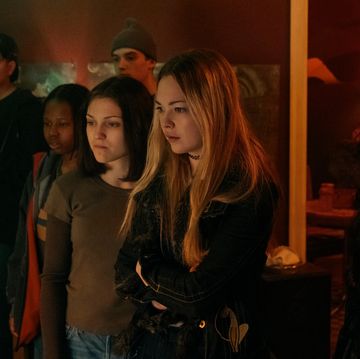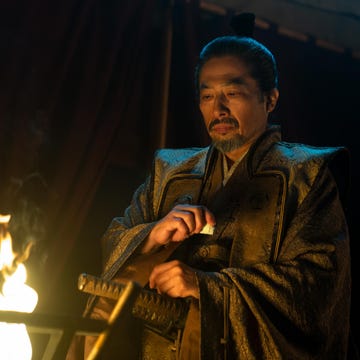When Damon Lindelof met with HBO to talk about turning Tom Perrotta's post-Rapture novel, The Leftovers, into a series, he was asked to describe how he envisioned the show's tone. His response, according to an interview with him: "If Lost and Friday Night Lights had a baby and then that baby was severely neglected, that would be The Leftovers."
That statement makes sense based solely on the talent behind this bleak but absorbing new drama. Lindelof, Lost's co-creator and showrunner, is in the same role here, while Peter Berg — the same guy who developed and executive-produced NBC's Friday Night Lights — is both an executive producer and the director of The Leftovers' first two episodes. It's inevitable, then, that The Leftovers has a little Dillon, Texas, and a little Smoke Monster in its DNA.
After watching the first few episodes of The Leftovers, which debuts this Sunday on HBO, the connections to those two shows are even more clear. Like Friday Night Lights, The Leftovers engages in close character studies of everyday people living in a small town. (We're not in Texas anymore, but in Mapleton, New York, although early on, the show does feature a Texas congressman played by Brad Leland, aka Buddy Garrity.) Like Lost, The Leftovers focuses on sudden disaster and its possible connection to the spiritual world. The action of the HBO show begins three years after the Departure, a Rapture-like event that caused two percent of the world's population to suddenly vanish, with no explanation as to where they went, why, or how. All anyone knows is that a whole bunch of people — men, women, crying infants — were there one second, then gone the next. In a way, this plot is the reverse of Lost. In the Oceanic 815 saga, an airplane falls from the sky and drops its survivors on a mystical island they don't recognize; in The Leftovers, the present-and-accounted-for must try to move forward in a world they know well, where a fraction of humanity has been sucked up into thin air.
But perhaps the most prominent narrative strand that connects these three programs is the fact that all of them explore the way we, as individuals and communities, respond to crises. While FNL eventually delved into all kinds of everyday conflicts, from high school love triangles to battles over who should start as QB, the series began with a trauma, the injury that paralyzed Jason Street, and initially documented how a cluster of players and families handled the challenging days that followed. Lost dealt even more directly with seeking equilibrium after an unanticipated, catastrophic event, which is why, then and now, in retrospect, it feels like the ultimate post-9/11 show. Debuting three years after the bombings of the World Trade Center and the Pentagon, much the way The Leftovers picks up three years post-Departure, Lost caught Americans at a moment when, just like Jack Shepard and co., they were still trying to regain their bearings. When Dominic Monaghan's Charlie famously asks in the Lost pilot, "Guys, where are we?" he's trying to determine into what sort of freakish, tropical, polar bear-populated hellscape he and his fellow passengers have fallen. But with that question, he also inadvertently captured the national mood. After 9/11, shoe bombers, anthrax attacks, and the commencement of the war in Iraq, not to mention the reelection of George W. Bush looming just around the corner, surely Charlie Pace wasn't the only one in September 2004 wondering: Seriously, guys, where are we?
The Leftovers is different in one significant way from both Lost and FNL, however, and this is where Lindelof's "severely neglected" comment enters the picture. In the two previous series, crises may have been core to the narrative, but so was hope. In The Leftovers — or at least in the handful of episodes sent in advance to critics — there is none of that. Many Lost fans felt unsatisfied by that series's finale because they didn't get the kind of closure they were hoping for. The Leftovers nips that issue in the bud by announcing from the get-go that there is no such thing as closure. There are just uncertain days, followed by more uncertain days, each of them weighed down by the inability to imagine better ones ahead.
As Perrotta did in his novel, the TV version of The Leftovers holds up a mirror to the way our society processes grief and reflects it right back at us. Just as many people refer to that aforementioned al Qaeda attack as "9/11" or "September 11," The Leftovers shorthand for the Departure is simply "October 14." And just as so many do after every mass shooting that seems to happen daily in this country, the residents of The Leftovers' Mapleton numbly attempt to make sense out of the senseless.
In the first episode, a remembrance ceremony takes place on the third anniversary of the Departure, an occasion dubbed Heroes Day. During that event, a statue is unveiled, the names of every missing person are read out loud, and a parade is scheduled. When the mayor briefs local officials beforehand about the plans, a cop questions referring to the suddenly deleted ones as heroes. "They're heroes because no one's going to come to a parade on 'We Don't Know What the Fuck Happened Day,'" the mayor shoots back.
Communities are supposed to come together in times of pain, but in The Leftovers, everyone is torn apart, giving Lindelof, Perrotta (the show's other co-creator), and the rest of the writers an array of viewpoints to explore. Among others, there are the men and women of the Guilty Remnant, a pseudo-cult whose members take vows of silence, smoke heavily, dress in all white, and roam the streets as a reminder that normal life can't and shouldn't continue, a position that naturally antagonizes the not-so-guilty majority. There's the reverend (Christopher Eccleston) who preaches about exactly how unchosen the supposedly chosen ones really were, while quietly committing sins of his own. There's Nora Durst (Carrie Coon), a woman suddenly thrust into fame when every member of her family went poof on October 14. And there's Kevin Garvey (Justin Theroux), the town's police chief who has a pair of distant, troubled young-adult kids to look after and the burden of a thousand responsibilities strapped to his already overtaxed shoulders. If there's a main protagonist in this large ensemble, it's Garvey, a role that Theroux, normally a supporting player when he's not the guy writing the screenplay, ably handles with a firmness that easily dissolves when he's confronted by home security systems that won't disable or the unexplained absence of his dry-cleaned white button-down shirts. Garvey clearly once was his family's rock, and now spends every day — days that usually begin with him waking from nightmares scarcely worse than his actual reality — attempting to avoid avalanches.
Try counting how many times the characters in The Leftovers smile during the first three episodes. My guess is you won't get farther than the five fingers on your right hand. The rare laughs, when they do come, arise from dark, wry ironies, like the acknowledgment of the Departure's complete and utter randomness. "I get the Pope," a befuddled bartender says as a cable news segment flashes through the celebrities (Condoleeza Rice, Jennifer Lopez, Salman Rushdie, Shaquille O'Neal) zapped away. "But Gary fuckin' Busey?"
Despite the storm cloud that hangs over the initial episodes, there's something compelling and almost hypnotic about The Leftovers that turns it into an addiction by the end of episode two. As the narrative progresses, the characters make decisions that frequently surprise. Even viewers who have read Perrotta's novel may not be able to predict exactly where things are going, which makes The Leftovers a narrative that's worth digging into, even if, at times, it's unbearably sad.
As Hollywood-trained human beings who naturally crave sweet relief, we expect that, at some point amid all this desolation, someone will stand up and make an important motivational speech, a "Live together, die alone" monologue à la Lost's Jack Shepard, or a "Clear eyes, full hearts, can't lose" uplifter in the spirit of Coach Taylor of Friday Night Lights. That doesn't happen, and at this stage in The Leftovers, I hope it never does. Within the context of this series, it just wouldn't fit.
When something so unimaginable and shattering happens and there's no explanation for it, the truth is that no one — not the mayor, the cult leader, the cop, or the preacher — knows what to say to make anyone feel better. There are simply no words. The Leftovers not only gets that, but stays as faithful to that idea as believers do to their religions. Say your prayers if you must, this show tells us. But the only person who will hear them, if they're heard at all, might wind up being Gary effin' Busey.


